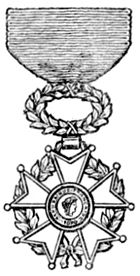 |
 |
 |
|
||
|
Napoleon
Bonaparte
|
|
| Career | Portraits |
| Quotes | Family |
| Loves | Letters |
| Plots | Murdered? |
| His will | Places |
|
Era
of Napoleon
|
|
| Powers | Opponents |
| Coalitions | Allies |
| People | Timelines |
| Key sites | Shrapnel |
|
Warfare
|
|
| Campaigns | Battles |
| Armies | Generals |
| Marshals | Winners |
| Glossary | Medical |
| Weapons | 1812 War |
| Uniforms | Battlefields |
|
War
at Sea
|
|
| Naval War | Heroes |
| Artworks | Signals |
| Nelson | Trafalgar |
|
Maps
|
|
| Key Maps | Peninsula |
| Animated | 1796/1800 |
| 1809 | Russia |
|
French
Revolution
|
|
| Revolution | Guillotine |
| Posters | People |
|
Art,
Film, Games
|
|
| Education | Goya |
| Sharpe | Hornblower |
| Books | Movies |
| DVDs | Music |
| Wargames | Images |
| Cartoons | Caricatures |
|
Other
|
|
| About Us | Sources |
| Awards | Sitemap |
| Links | Militaria |
| Miniatures | Reenactors |
| Forum | Quizzes |
| Home | Waterloo Diorama |
 The
Legion of Honour was an institution that was open to all men,
although initially only Frenchmen, who had either acted bravely
on the battlefield or had served civil France in some exemplary
way.
The
Legion of Honour was an institution that was open to all men,
although initially only Frenchmen, who had either acted bravely
on the battlefield or had served civil France in some exemplary
way.